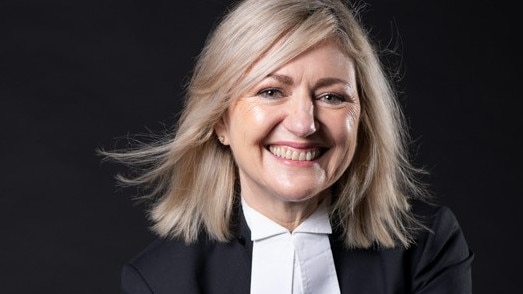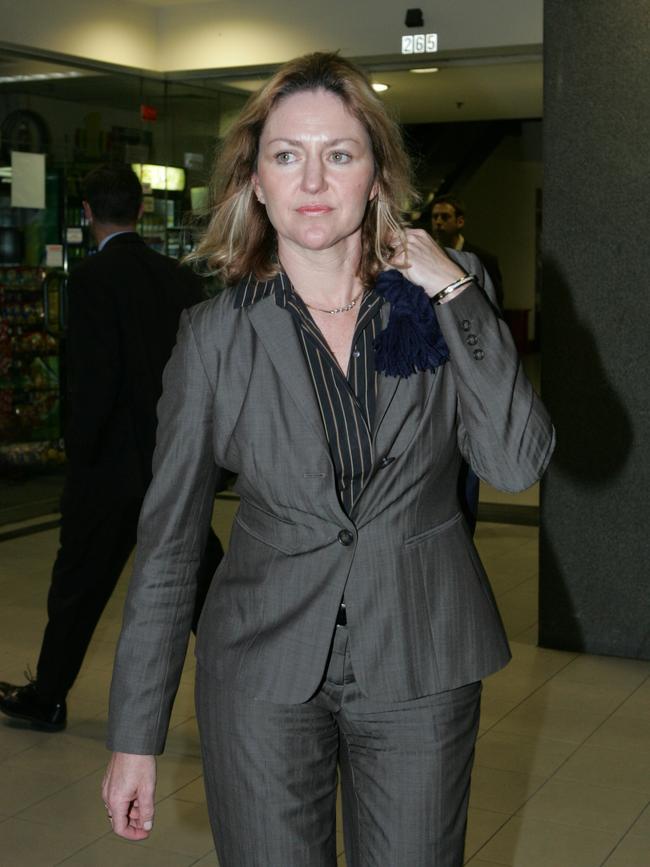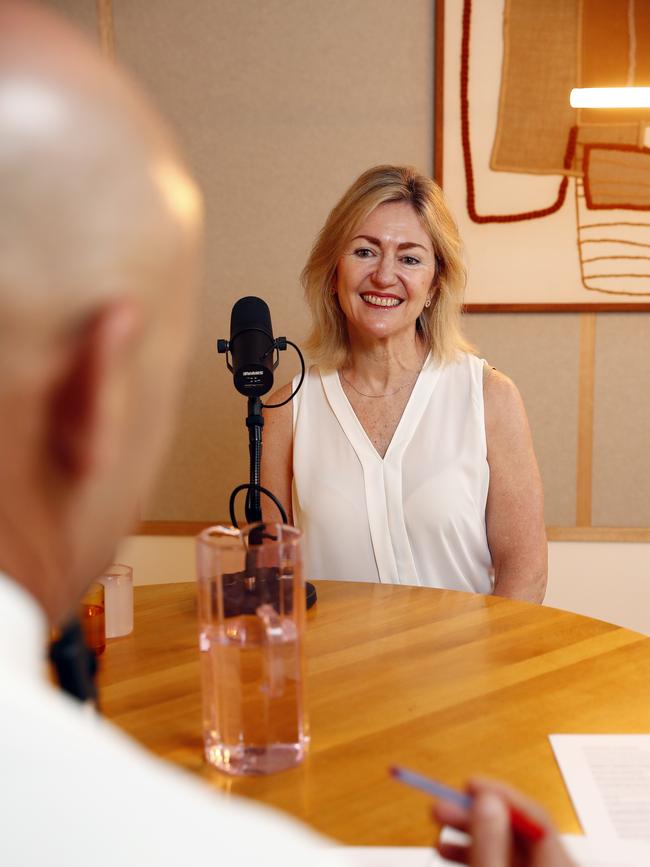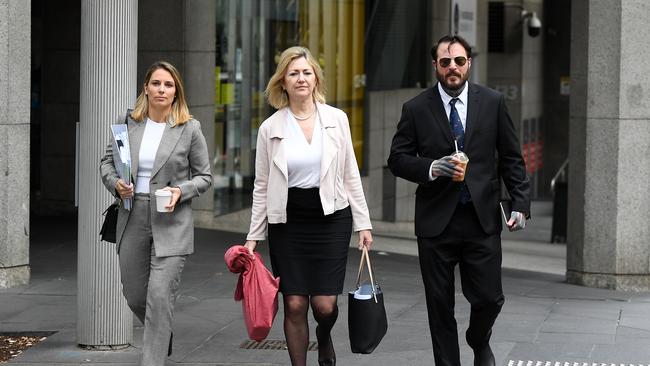Cunneen on switching sides: ‘I hadn’t expected to feel this’
Margaret Cunneen SC has long had a high public profile in NSW, first as a Crown prosecutor, and now as a criminal defence barrister. Her private life, faith and family have remained out of sight — until now.

Margaret Cunneen SC has long had a high public profile in NSW, first as a Crown prosecutor, and now as a criminal defence barrister. Her private life, her faith and her family have remained out of sight. Her family comprises three grown-up “boys” – Steve, Matt and Chris – and their father, Greg Wyllie, a martial arts instructor. The boys, now all over 30, have lovely partners and there is a new granddaughter, Blaise.
From what I’ve seen, they are close and enjoy each other’s company. One day I shared some beers with them while watching a footy match at their local pub. Another time we were all invited to celebrate, at a splendid suburban Indian restaurant, Cunneen’s success in defending a man accused of the murder of his wife. Gifts and laughter were shared. Down to earth and easy going, the family provides a secure castle for Cunneen in an unremarkable house in a friendly street in the middle of a typical northern Sydney suburb with off road parking for two cars, like most of the other houses in the street.
Like most working mothers, she has memories of performing evening domestic tasks while completely distracted by mental planning for the next day in court. There were many times she ruined suits and shoes racing into the house with hungry children in tow and starting the meal preparation in full business attire.
Those days are long behind her. She recently turned 60, and agreed to collaborating with me on this book about her career, allowing me access to her archives (chaotically scrambled in several large boxes) of speeches, lectures, opinion pieces, courtroom statements, massive folders containing trial transcripts, dozens of magazine and newspaper articles, email exchanges and hundreds of thank you letters, for her work in court or her many public speaking engagements. I couldn’t help noticing one dated May 14, 1986 from the Government Supply Department which began: “On behalf of the Cleaning Service Branch of our Department I wish to thank you for your very informative and well-presented talk at our Inspectors’ Conference last week. Your session on Disciplinary Procedures opened the eyes of a number of our Inspectors …”
Four years later she was a Crown prosecutor.

The rather haphazard reams of paper also surrendered a quaint little A5 booklet, The Changing Roles of Women, published in 1996 by the Office of the Director of Equal Opportunity in Public Employment. She was the first of 17 women writing their brief autobiographies in it. She wrote: “I have been happily employed in the service of the State since shortly after I finished the Higher School Certificate half my life ago. I had always envisaged spending my first few years post school on a university campus but quite unexpectedly I was evicted from my home on the night of the last Higher School Certificate exam. Survival dictated I seek permanent employment …”
Her troubled relationship with her parents has eased. She has always included her parents in family events and they moved from their southwestern Sydney home when her children arrived, to live closer to her. She shops and cares for her widowed mother every day, with the help of “the boys”.
From all accounts, Cunneen prosecuted for the Crown with precision, and always ready with a genuine smile, even in the face of the most brutal crimes and hardened criminals. And a few haughty judges. By 2015, she had recorded a long succession of convictions against rapists and murderers and had served as commissioner of the NSW Special Commission of Inquiry into matters relating to the police investigation of certain child sexual abuse allegations in the Roman Catholic Diocese of Maitland-Newcastle.
She was giving speeches, making presentations and media appearances. But she wasn’t part of the “progressive” legal establishment. Ever cheerful and polite, she nevertheless irked some of her professional colleagues for that. She was about to be a pioneer victim of what has become known as cancel culture. She sees that even more clearly now, in retrospect.
At the end of 2014, Cunneen found herself fighting for her reputation and her career. The NSW ICAC was raiding her home, confiscating her phone and pursuing her for corrupt conduct. Just three years later, Cunneen had not only been fully exonerated but she was also to see her nemesis, ICAC commissioner Megan Latham, resign and the ICAC Inspector rebuke the organisation.
Latham, once a solid professional friend and Cunneen supporter, is now on the list – short as it is – of self-declared professional enemies. They turn up in the controversies section of this book. But Margaret Cunneen SC also has letters of support from the highest echelons of the law, including former High Court judge Michael Kirby.
Some of those who have written to her, many on thank you and good wishes cards, have come across Cunneen in court: on the receiving end of her prosecutorial prowess. Yet her professionalism and above all, her decency and fairness, has made a solid gold impression even on them. It is hardly surprising, though, that much of the thank you mail has come from those for whom she has helped deliver justice and closure – for the darkest crimes against them, like rape and murder.
Retiring from the public service at a fit and young 60 meant she could embark on a brand-new chapter of her life: defence. It was a liberating decision but she was not sure how it would go.
Neither was Ross Hill, a solicitor who had always been on the other end of the bar table to her. Late in January 2019, just days after Margaret retired, he rang to say he needed counsel to appear in court for his client in a murder trial.

“It’s only legal aid,” he told her, indicating the modest level of fees his client’s case would generate. “But maybe I’ve caught you before you’ve got anything else to do.”
Cunneen went to the prison at Silverwater to meet his client. “And I found immediately that the same old feelings of empathy and compassion for someone’s situation (that I always felt for victims of crime) assisted me to see it through his eyes. And I did because my client was someone who was charged with murder, but he had not even been present in the same room that the murder took place. It was part of a ‘joint criminal enterprise’. But he assured me that he had no idea what was going to take place with others in that room. And I didn’t have to believe him, although I happened to, and knew that I’d be able to convey his case to the jury with great conviction.”
They eventually all pleaded guilty to manslaughter – as they had offered the DPP, in vain, from the start. They were sentenced on some drug supply charges which had emerged during the homicide investigation, so the penalty was quite high.
In a moving handwritten letter late in the trial (dated March 20, 2019) to Margaret, one of the co-accused, Jack Davies, bares his soul:
Dear Ms Cunneen,
I have to get this onto paper as soon as possible.
First and foremost I need to say with no filter that today was without a doubt the most sickening and terrified I have ever felt, helpless, lost, hopeless, afraid, disappointed and also frustrated.
I honestly was overwhelmed by the fear and the feeling that my life was slipping away. Then you were up. I reopened my bible and I have a mini daily devotional called “the daily bread” …
I am so scared … you saw me in my most vulnerable state and like the mother I grew up without, I felt that you protected and saved me.
If her first case as defence counsel was low profile, she was soon back in the spotlight, when she was briefed to represent Craig Folbigg in the highly public inquiry into Kathleen Folbigg’s convictions for the murders of her four children.
“Craig Folbigg was offered a state funded legal representation because he was the father of the four victims,” she says. “And his position was that the convictions of his former wife were just and fair and had been tested right up to the High Court years before and that this inquiry really shouldn’t go ahead.”
(A petition originally lodged in March argues that new evidence suggests that the children died of rare medical conditions; the case is again subject to review.)
“In the first year there has been the need to learn not to stand up when the judge calls upon the Crown. I didn’t realise how much ‘Madam Crown’ had become part of my identity,” she says.
“Now I literally have to Araldite myself to the seat so that I don’t rise when the judge says ‘Madam Crown’ … I just have to remember that I’m not there for the Crown anymore.”
But there was more depth to the change in her psyche: “I hadn’t really expected to feel this, but I haven’t had a case so far where I haven’t empathised to some degree with the client and seeing that to some degree at least, the Crown has it wrong,” she says.
“When you meet the subject of this prosecution, he or she … and I haven’t had many women yet … can fill in for you all of the texture and all of the explanations because it rarely is the case that any aspect of the evidence is all one way.”

She was inspired also by a speech given by federal Labor MP Tanya Plibersek’s husband Michael Coutts-Trotter, appointed secretary of the NSW Department of Premier and Cabinet by incoming Liberal Premier Dominic Perrottet in October 2021, a reformed heroin addict jailed for drug importation when he was a young man.
“I decided to heed his exhortation not to continue to snub people who have gone to prison and paid their debt to society. I thought it important that prosecutors don’t subscribe to lifelong sentences,” she says. She holds that uncommon and often unpopular view, even when it comes to parole for the members of the Bilal Skaf gang whom she prosecuted for multiple rapes in 2000.
Mohammed Skaf was paroled in October 2021 – and Cunneen supported the decision.
This is an edited extract from The Boxing Butterfly (Wilkinson Publishing) by Margaret Cunneen SC, introduced and edited by Andrew L. Urban.



To join the conversation, please log in. Don't have an account? Register
Join the conversation, you are commenting as Logout